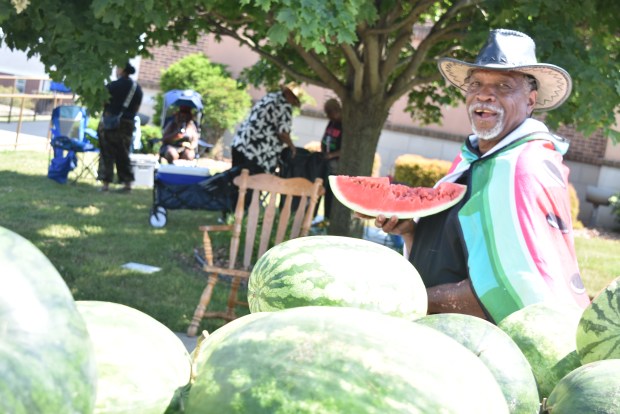When I’m asked to sometimes lead a panel discussion or roam an audience with a handheld microphone to field questions from an audience, I good-naturedly refer to myself as a substitute for Phil Donahue.
Audiences usually get a chuckle and make the parallel of “Phils.”
If I were to make this same reference to “this other Phil” in my Purdue University Northwest classes I teach? Mostly filled with students born in 2006, they have no idea who Phil Donahue was, is, and why he should still be a name remembered and lauded for changing the landscape of daytime television talk shows. Most of these same students have very little knowledge or name recognition of Oprah Winfrey since they would have only been age 5 or 6 when Winfrey ceased her popular daytime talk show in May 2011.
Oprah has always said: “Without a ‘Phil Donahue Show,’ there couldn’t have been an ‘Oprah Winfrey Show.’ “
I’ve interviewed both Oprah and Phil and found both to be as nice and down-to-earth as the personas showcased on their television shows. Phil Donahue was someone I met and interviewed three times. My interview rule of thumb is that “everyone, famous or everyday folk, can have a bad mood day.” But encounter that same famous person three times, and find the mood, bad or good, is consistent every time? That’s a pretty good indicator.
Phil Donahue was always a regular, everyday nice guy and a great face-to-face interview, too.
Our last encounter was in 2010, while he was with actress wife Marlo Thomas in Chicago for her to promote her latest book “Growing Up Laughing.” Before that, it was spending time with Phil D. in 2008 while he promoted his film documentary about the atrocities of war titled “Body of War.” Even earlier, I crossed paths with Phil in the 1990s at a charity party in Chicago which included other Chicago media name claim-to-fames such as Ann Landers and Irv “Kup” Kupcinet.
Phil Donahue died at age 88 on Sunday, Aug. 18, at his home on the Upper East Side of Manhattan, according to family spokesperson Susan Arons, who confirmed his wife and children were at his side “after a long illness.”
As the Midwestern father of all daytime talk shows, Phil Donahue was never at a loss for words.
Donahue, a 1957 graduate of Notre Dame University, welcomed his TV viewers and studio audiences to be eager to learn about topics never before discussed by mainstream media. His approach was far different from that of other earlier TV daytime talk contemporaries of the 1960s and 1970s, such as Merv Griffin, Mike Douglas, Virginia Graham, Dinah Shore or Dick Cavett, or even his evening counterpart Tom Snyder.
Donahue did his syndicated show, first from Cleveland, then Chicago and, finally, New York, for more than 25 years on a budget far smaller than what’s considered normal today. He moved the show to Chicago in 1974 to WGN and later WBBM, Channel-2, before he moved it to New York in 1985, just as Oprah was launching her new show.
Oprah devoted an entire hour tribute to Donahue for her Nov. 10, 2010 episode as a way to dispel the insinuation by “tell-all” biography author Kitty Kelley in her 2010 published Oprah biography that Oprah had always felt “slighted” by Donahue for not “welcoming” her show launch when she first arrived in Chicago.
Thomas first met Phil as a guest on his talk show in 1977 and was immediately dazzled by his gentle and caring manner. The couple married in 1980 and during the early part of their marriage, they lived in Phil’s house north of Chicago in Winnetka with his children from his first marriage. Phil’s only daughter Rose Donahue, among four brothers, worked in Indianapolis at the Associated Press Bureau office located at The Indianapolis Star newspaper in 1988, back when I was first starting my journalism career.
During our 2008 chat, Phil D. shared with me a few of his favorite talk show moments:
* Managing to get controversial atheist Madalyn Murray O’Hair, then tagged “the most hated woman in America” for arguing to the U.S. Supreme Court to remove prayer from schools, on his show. O’Hair, who disappeared mysteriously in 1995 and was found to have been murdered in 2001, was Donahue’s very first guest.
* Having Carol Burnett and her then-producer husband Joe Hamilton appear on his show in 1981 with daughter Carrie Hamilton to discuss their drug abuse problems. “Carol told the parents in the audience, it’s okay to be a mom or dad who is a snoop,” Donahue recalled. “She said search your children’s bedrooms and don’t worry about invading privacy if it can save your child’s life.”
* Meeting Thomas, his future wife, while she was a guest on his talk show in 1977.
* Having Ryan White on his show after the young teen from Kokomo was diagnosed in 1984 with
AIDS, which resulted from a blood transfusion. At odds with his high school and the parents of
classmates, who feared White’s disease would be contagious from casual personal contact, White
fought to return to school and graduate with his classmates. He lived five years longer than predicted, appearing often on Donahue’s show before he died in 1990 just a short time before his high school graduation. Donahue, along with Elton John, Michael Jackson, first lady Barbara Bush and many other celebrities, were among the more than 1,500 people who attended his funeral in Indianapolis.
Philip Potempa is a journalist, published author and the director of marketing at Theatre at the Center. He can be reached at pmpotempa@comhs.org.




